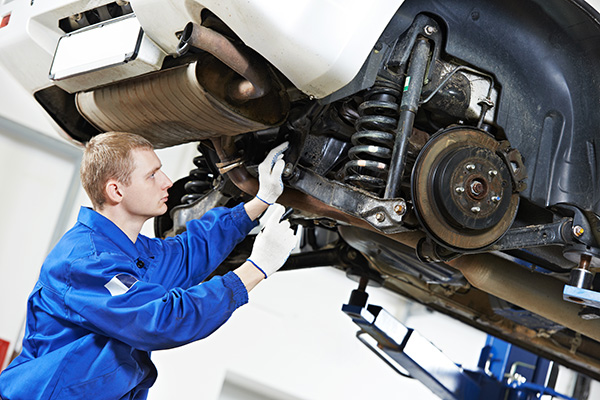
Your vehicle’s suspension system does more than just make the ride comfortable—it’s responsible for stability, steering, and keeping all four tires firmly on the road. So when strange noises start coming from the suspension, it’s not something to brush off. Clunks, creaks, or squeaks might seem minor at first, but they often point to wear in important components that affect how your vehicle handles.
If your car has been sounding different lately, here’s how to tell when those suspension noises mean something’s wrong—and when it’s time to get it looked at.
Where the Noise Comes From
Suspension noises can come from a number of parts working together: shocks or struts, control arms, bushings, sway bars, ball joints, and more. Most of the time, you’ll notice the sound during very specific conditions—like when going over bumps, making tight turns, or braking. That’s because suspension components are under stress during those moments, and any worn-out or loose parts will usually speak up.
One of the most common noises is a clunk or knock when driving over speed bumps or rough roads. That’s often a sign of worn-out bushings or a loose sway bar link. These parts are designed to absorb impact and keep everything tight, and once they wear down, the metal-on-metal contact creates that unmistakable sound.
If you hear a squeaking or groaning noise while turning the wheel or driving at low speeds, it could be worn ball joints or strut mounts. These parts help control the movement of your wheels and allow the suspension to pivot. When they dry out or develop too much play, they’ll often start to make noise, especially on older vehicles.
Pay Attention to the Feel of the Ride
Strange noises often come with changes in how your vehicle feels on the road. If your car starts to bounce more than usual after hitting a bump, the shocks or struts might be worn out. These parts control the motion of your suspension and keep the tires in contact with the road. When they begin to fail, the car may feel loose or unstable, particularly at higher speeds or during cornering.
Another common symptom is steering that feels vague or less responsive. If the car doesn’t return to center as quickly or seems to wander slightly, suspension issues could be behind it—especially if you’re also hearing clunks or creaks while turning.
When the Noise Gets Worse Over Time
Suspension problems tend to get louder and more noticeable the longer they go unchecked. What starts as an occasional noise over rough pavement might eventually show up during everyday driving. If you notice that the sound is becoming more consistent, especially during common maneuvers like backing out of your driveway or going over speed bumps, it’s time to schedule an inspection.
Even if the car still feels safe to drive, worn suspension parts can accelerate tire wear, strain the steering system, and make it harder to control the vehicle in emergency situations.
Don't Rely on Sound Alone
While noises are usually a clear indicator that something’s wrong, not all suspension issues make noise right away. That’s why it’s important to look for other signs as well, like uneven tire wear, fluid leaking from shocks or struts, or a vehicle that leans to one side. These clues often show up before the problem gets loud.
It’s also worth noting that not every squeak or creak points to a major failure. Some noises might come from dry bushings or minor hardware wear. But you won’t know how serious it is until it’s been properly inspected.
Extreme Auto Repair – Suspension Inspections in Parker, CO
At Extreme Auto Repair in Parker, CO, we can figure out exactly what’s causing those suspension noises—and whether it’s something simple or something that needs immediate attention. If your vehicle doesn’t feel as tight or sounds a little off every time you hit a bump, stop by for a suspension check. We’ll take a closer look and get you back on the road with confidence.